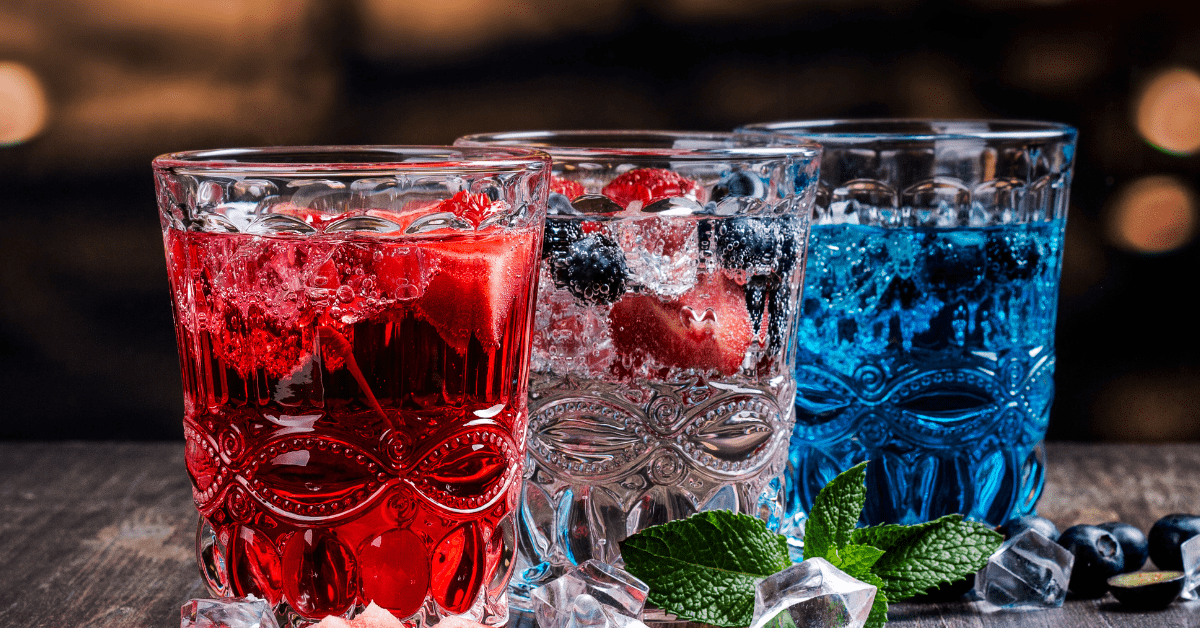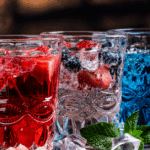The 4th of July is all about fireworks, cookouts, and ice-cold drinks in hand. But while we’re watching the grill and piling on sunscreen, many of us overlook what’s in our cups, and how those “healthy” drinks might be sneaking in extra sugar, hidden calories, or ingredients that put extra stress on our hearts.
This year, let’s break down a few popular summertime drinks that seem good for you, but can actually raise your risk for blood sugar spikes, dehydration, and higher blood pressure, and how to swap them for options that truly keep your heart happy.
How Sugary or Boozy Drinks Impact Your Heart
When you drink something loaded with added sugars, or even certain “natural” sweeteners, your blood sugar rises fast, then crashes, leading to fatigue, cravings, and inflammation. Research shows that consistently high sugar intake is linked to obesity, type 2 diabetes, and heart disease.1
According to the American Heart Association, diets high in added sugars are directly associated with a greater risk of dying from cardiovascular disease (heart disease). Just one or two sugary drinks a day can contribute to elevated triglycerides, high blood pressure, and weight gain — all silent drivers of heart trouble.2
That’s why it’s so important to take a closer look at the drinks we often label as “healthy” at summer cookouts. Some popular 4th of July favorites might sound refreshing and light, but they can pack in surprising amounts of sugar, hidden calories, and ingredients that keep your heart working harder than it needs to. Let’s break down a few of these “healthy” drinks, and how to swap them for options that truly help you celebrate while protecting your heart.
“Healthy” 4th of July Drinks That Might Be Doing More Harm Than Good
1. Store-Bought Smoothies and “Green” Juices
Pre-bottled smoothies and green juices often look healthy but can pack 30–50 grams of sugar in one bottle, that’s more than a can of soda. Even “no sugar added” doesn’t mean low sugar if it’s loaded with fruit purees and concentrates.3
Better swap: Make a DIY smoothie at home with whole fruits, a handful of leafy greens, and a scoop of protein powder or Greek yogurt. The fiber and protein help slow sugar absorption and keep you full longer.
2. Sweet Tea or Flavored Lemonades
A classic cookout pitcher of sweet tea or lemonade can contain nearly 8–10 teaspoons of added sugar per cup. While it’s refreshing, that sugar bomb spikes your blood glucose and stresses your arteries.4
Better swap: Brew unsweetened iced tea and add lemon slices or fresh mint for flavor. Or try sparkling water with a splash of 100% fruit juice for a light, fizzy twist.
3. “Skinny” Cocktails and Hard Seltzers
Skinny margaritas and canned hard seltzers are marketed as low-calorie, but the alcohol still affects your heart. It can raise blood pressure and interfere with your sleep, which is essential for heart health. Plus, some flavored drinks contain added sweeteners and artificial flavors.5
Better swap: If you drink, stick to a simple cocktail with a clear liquor, club soda, and fresh citrus, and drink water in between to stay hydrated. Or opt for a fun mocktail: sparkling water, muddled berries, and a squeeze of lime.
4. “All-Natural” Fruit Punches
Fruit punch sounds healthy because it says “natural” on the label, but many are made with sugar syrups and juice concentrates instead of actual fruit. This means little fiber, big sugar hits, and zero staying power for your blood sugar.6
Better swap: Make your own fruit punch with real fruit slices, unsweetened iced tea, or infused water. Freeze some berries or pineapple chunks to use as flavorful ice cubes!
Actionable Tips for a Heart-Healthier 4th of July Sip
- Stay hydrated: For every alcoholic drink, match it with a glass of water.
- Use fresh herbs and fruit: Flavor your water or sparkling water with mint, basil, or citrus.
- Go light on sweeteners: Taste before adding sugar, you may not need much.
- Keep an eye on serving size: Even healthy drinks can add up fast.
Pro-Tip: When in doubt, reach for water first. It’s the simplest and strongest choice for your heart and your whole body.
Conclusion
Celebrating big doesn’t mean your heart health has to take a hit. By making a few mindful swaps, you can toast the holiday, feel your best, and protect your heart for many cookouts to come. That’s real freedom, and exactly what your body deserves.
References:
- Rippe, J. M., & Angelopoulos, T. J. (2016). Sugars, obesity, and cardiovascular disease: results from recent randomized control trials. European Journal of Nutrition. doi: 10.1007/s00394-016-1257-2
- AHA. (2016, August 22). Kids and added sugars: How much is too much? Retrieved from American Heart Association: https://www.heart.org/en/news/2023/05/23/kids-and-added-sugars-how-much-is-too-much
- Oaklander, M. (2018, August 20). Should I Drink Smoothies? Retrieved from TIME: https://time.com/3737812/smoothies-healthy-breakfast-fruit/
- Harvard School of Public Health. (2022, April). The Nutrition Source: Added Sugar. Retrieved from Harvard T.H. Chan School of Public Health: https://nutritionsource.hsph.harvard.edu/carbohydrates/added-sugar-in-the-diet/
- BHF. (2025, January 31 ). Alcohol and heart disease: what are the risks? Retrieved from British Heart Foundation: https://www.bhf.org.uk/informationsupport/heart-matters-magazine/medical/effects-of-alcohol-on-your-heart
- Hannasch, B. (2025). Rethink Your Drink: Be Aware of Added Sugars in Common Drinks for You and Your Children. Retrieved from District 2 Public Health: https://wic.phdistrict2.org/blog/added-sugars-in-common-drinks








